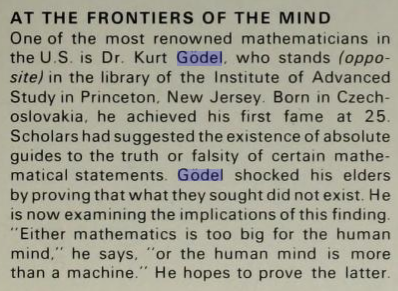Turing's Thesis and a More General Physical Principle
Recently, Matthew P. Szudzik posted an article to the arXiv
server that is entitled "Is Turing's Thesis the Consequence of a More General Physical Principle?" Szudzik ivnestigates Robert Rosen’s hypotheses, which were put forth in "Church’s thesis and its relation to the concept of realizability in biology and physics". Roughly, one can say that these hypotheses state that the universe is discrete, deterministic, and computable. A direct consequence of these hypotheses is the Church-Turing Thesis. Szudzik recognizes that these hypptheses are not correct and, thus, one needs to reformulate them:
Unfortunately, Szudzik ignores a number of papers that clearly demonstrate that there non-computable phenomena in the universe. In addition, he has failed to put hypercomputation in the picture. One could easily say that there are phenomena that are not computable but which are clearly hypercomputable. Nevertheless, a major problem with Szudzik's approach is that he assumes that we have deep understanding of the laws of the universe, when in fact we know next to nothing!
server that is entitled "Is Turing's Thesis the Consequence of a More General Physical Principle?" Szudzik ivnestigates Robert Rosen’s hypotheses, which were put forth in "Church’s thesis and its relation to the concept of realizability in biology and physics". Roughly, one can say that these hypotheses state that the universe is discrete, deterministic, and computable. A direct consequence of these hypotheses is the Church-Turing Thesis. Szudzik recognizes that these hypptheses are not correct and, thus, one needs to reformulate them:
This sort of reformulation was first attempted by Konrad Zuse [18, 19] in the 1960’s. Since then, increasingly sophisticated attempts have been made by Edward Fredkin [3] and Stephen Wolfram [17]. In contrast, Roger Penrose [9, 10] has speculated that the universe might not be computable, but efforts to find experimental evidence for this assertion have not succeeded.
Unfortunately, Szudzik ignores a number of papers that clearly demonstrate that there non-computable phenomena in the universe. In addition, he has failed to put hypercomputation in the picture. One could easily say that there are phenomena that are not computable but which are clearly hypercomputable. Nevertheless, a major problem with Szudzik's approach is that he assumes that we have deep understanding of the laws of the universe, when in fact we know next to nothing!

Σχόλια